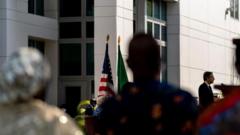Effective July 8, the U.S. has shortened the duration of visas for Nigerian applicants to three months and implemented new vetting processes, potentially reflecting growing diplomatic unease between the two nations.
U.S. Revises Visa Policy for Nigerian Citizens Amidst Diplomatic Tensions

U.S. Revises Visa Policy for Nigerian Citizens Amidst Diplomatic Tensions
The United States implements significant changes to non-immigrant visa regulations for Nigeria, reducing validity and increasing scrutiny.
In a major shift, the United States has modified its non-immigrant visa policy for Nigerian citizens, slashing the validity of most visas to three months and limiting them to single-entry only. Beginning on July 8, this amendment comes as part of a broader global reciprocity realignment by the U.S. Department of State, which previously allowed for multiple entries over longer periods, often two years or more.
The Nigerian government has yet to respond formally to the changes. Meanwhile, the State Department emphasizes that visa policies remain "subject to ongoing review" and may be altered based on diplomatic, security, and immigration considerations that evolve over time. U.S. authorities assert they are collaborating closely with Nigerian officials to ensure compliance with critical international standards. Key benchmarks include the issuance of secure travel documents, management of visa overstays, and sharing security or criminal data to enhance public safety.
Adding another layer to the scrutiny of applicants, the U.S. has mandated the inspection of social media accounts of all foreign visa applicants, including Nigerians, for any indications of negative sentiment towards the U.S. citizens or its foundational principles.
Despite the tightening of U.S. visa restrictions, Nigerian students remain a significant demographic in U.S. educational institutions. The latest 2024 Open Doors report highlights that Nigeria ranks as the seventh largest source of international students in the U.S. and the highest in Africa, with an increase of 13.5 percent from the previous year, totaling 20,029 enrollees.
The visa policy changes have incited mixed reactions. Bashir Ahmad, a former aide to ex-President Muhammadu Buhari, argued on social media that these measures indicate a growing U.S. discomfort with Nigeria's emerging global alliances, particularly following President Bola Tinubu's recent attendance at the BRICS summit in Brazil. He posits that the issue is less about reciprocity and more about rising geopolitical tensions.






















